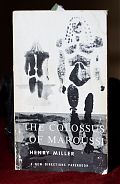
Henry Miller
The Colossus of Maroussi
Which Greece do you conjure in the instantaneous drop of the name? Is it the Greece of mythical proportions, wrought and re-wrought with the passing of centuries and changing tides of thought? Is it the Greece which beacons with white beaches and deep blue, the deepest blue for it is a mixture of sky, sea, and sun? Tourist trap? A country alive in its traditions? Alive and defended against the ever creeping fog of globalization. Is it the Greece, child of the Mediterranean, whose rich food and smoldering-eyed women allow you to pass, seamlessly, between one world and the next?
Personally, I don’t know Greece. I have never landed my feet on its loamy soil nor have my fingers grasped at it in attempt at an arching historical understanding. I haven’t read Homer; I don’t pretend to know the teachings of Socrates or the stories of the Byzantine. Henry Miller himself admits of his own faintness of knowldge. He departs from the shores of France on a blind whim at the twilight of an outbreaking war. He departs in search of the peaceful and peace he uncovers. Henry Miller writes to us of a Greece not yet known and a Greece that may never be again.
Voyages are accomplished inwardly, and the most hazardous ones, needless to say, are made without moving from the spot.
Henry Miller is lying naked on a beach in Corfu, where the sand glistens like broken mirrors like a shower of light sent from above. He is fearlessly straddling a cliff high above the waves breaking rhythmically against the shore. His previous books might cause one to believe he is pounding his chest in a mighty act of defiance, but no, this is Henry Miller and he is in Greece. He sits, quietly, in a state of prolonged meditation, with every breath he is nearing the universal.
. . .in the great peace that came over me I heard the heart of the world beat. I know what the cure is: it is to give up, to relinquish, to surrender, so that our little hearts may beat in unison with the great heart of the world.
Henry Miller walks through the temples and the tombs of the gods. In Agememnon’s tomb he experienced an awakening of sorts. He was shown the world for what it is, what it has been and what potentially will be. He was brought back to ‘human proportions,’ eager to accept, poised to give anything that was asked. Around this life-altering event the book pivots. The gods spoke to him from a realm unknown. They told him fabulous stories of human gods and godly humans, he did not doubt them for a moment. I say there were gods who roamed everywhere, men like us in form and substance, but free, electrically free.
The Colossus of Maroussi can be considered a travel book in the most expansive sense. To travel, to move from one location to the next, is in itself nothing. It is an abrupt and realized change which frightens people into remaining stationary, whether mentally or physically. Traveling is merely a can-opener applied to ones very being, causing ones conception to rise to the purely receptive, for it is a swirl of stimuli that arise as soon as one does not know where in fact one is. I do believe that one day I will travel without moving from one spot, but for now I will joyfully take my suitcases and the luxurious rapidity of air flights and go with it, because that is all I know how to do.
If it is convincing you need for an invocation of departure defined either way the choice is your own, then I highly recommend this book to you. The Colossus of Maroussi is nothing if not another implement of the prodigal can-opener. Its possibilities extend to the revelation of the contents of every bare soul, including your own. It is nothing if not a finely executed anthem for the life abundant.
Why don’t they? Because nobody can enjoy the experience he desires until he is ready for it. People seldom mean what they say. Anyone who says he is burning to do something other then what he is doing or be somewhere other than where he is is lying to himself. To desire is not merely to wish. To desire is to become that which one essentially is.
[Listen to Henry Miller read from the Colossus of Maroussi and Black Spring. Awesome.]
· · · · · · · · · · · · · · · · · · · ·